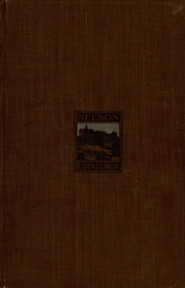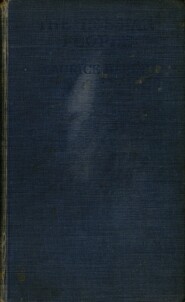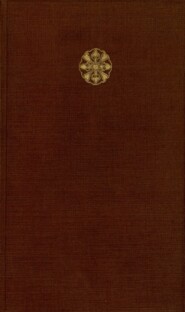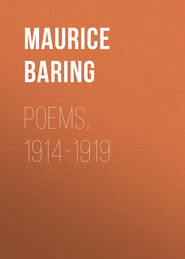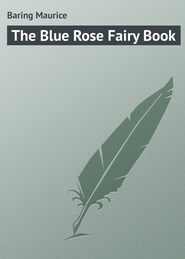По всем вопросам обращайтесь на: info@litportal.ru
(©) 2003-2024.
✖
Passing By
Настройки чтения
Размер шрифта
Высота строк
Поля
G.
From the Diary of Godfrey Mellor
Sunday, March 29th. Hôtel St Romain, Rue St Roch, Paris
Went to a concert at the Cirque d'Été this afternoon, not a very interesting programme. A great deal of Wagner, and L'Après-midi d'un Faune.
Dined by myself at a Duval. Start for Florence to-morrow morning.
Tuesday, March 30th. Villa Fersen, Florence
Arrived this morning before luncheon after an exhausting journey second-class. In the carriage there was a soldier belonging to the Garde Républicaine. He said he was on duty at the Opera and had he known I was passing through Paris he could have given me a billet de faveur.
The Housmans' villa is at the top of a hill on the Bellosguardo side. It is rather a large house, covered with wistaria, with high windows with iron bars. It has a large empty salon with a piano. A fine room for sound. The garden is beautiful.
Wednesday, March 31st.
I walked down into Florence very early in the morning. I reached the town before anything was open and met a party of men in shorts and flannels running back to a hotel. They were Eton masters taking exercise. I didn't go to any picture galleries, but I walked about the streets and went into the Duomo, an ugly building inside. I got back for luncheon.
Housman said that they must leave cards in the afternoon and take a drive in the Cascine. They went out in a carriage and pair. I went for a walk to the Boboli Gardens. At dinner Housman said they had met several friends, and he is giving a dinner-party on Sunday.
Thursday, April 1st.
The Housmans took me to luncheon with a banker called Baron Strong. What the explanation of this title is I do not know. They live in the modern part of the town. He was a genial host, portly, with long white whiskers. His wife, the Baroness, an Italian, a distinguished lady. There were present a Marchese whose real name I was told was Goldschmidt, and his wife, a retired and talkative English diplomatist, a Russian lady, an Italian, who talked English, French and Russian with ease, called Scalchi, Professor Johnston-Wright, who is spending his holiday here, and a Frenchman. When the latter heard Scalchi talk every language successively he said to him: "Vous êtes une petite tour de Babel."
In the afternoon we left cards at several houses and villas and then went for a drive in the Cascine. Some people called at tea-time, but I escaped. After dinner Mrs Housman sang some Schumann, Frühlingsnacht, and the Dichterliebe. These songs, she said, suit Florence.
Friday, April 2nd.
I had a talk with the Italian gardener as far as my Italian permitted me to. I pointed out a plant, a mauve-coloured plant, I don't know its name, that seemed to grow in great profusion. He said: "Fiorisce come il pensiere dell' uomo." More calls in the afternoon, and another drive in the Cascine.
Housman has bought a large modern statue representing The Triumph of Truth, a female figure carrying a torch, with a serpent at her feet. She is triumphing, I suppose, over the snake.
Saturday, April 3rd.
We went to see the Easter Saturday ceremony at the Duomo, and then to luncheon at the Villa Michael Angelo. It belongs to a rich American called Fisk. There were present besides Mr and Mrs Fisk an English authoress, a picture connoisseur, Scalchi, an American archæologist, an Italian man of letters, and a Miss Sinclair, also an archæologist. Housman said afterwards this was the cream of intellectual Florence.
I sat between two archæologists. I found their conversation difficult to follow.
After luncheon we called on the British Consul's wife, whose day it was. Then after a drive in the Cascine we went home.
Easter Sunday, April 4th.
Mrs Housman went to Mass early. Went for a walk with Housman. On the Ponte Vecchio we met Ayton and his sister, Mrs Campion. Mrs Campion, he said, had insisted on him taking her to Florence.
Housman asked them to dinner to-night; they accepted. A great many people came to tea.
The dinner-party to-night was quite a large one. Baron and Baroness Strong, Lord Ayton, Mrs Campion, Mr and Mrs Fisk, Scalchi and the Marchese and his wife, whom we met lately. I sat between Mrs Campion and Baron Strong. After dinner Mrs Fisk played Chopin with astonishing facility, but without any expression.
A. intends to stay here another fortnight.
Housman said he received a telegram which will necessitate his meeting his partner at Genoa. His partner is on the way to the Riviera. He may have to go to Paris too, but he hopes not, and intends to be back in a few days if possible.
Monday, April 5th.
Housman left to-day for Genoa. I went with Mrs Housman to San Marco and the Accademia in the morning. In the afternoon to the Certosa with Mrs Housman, A. and Mrs Campion.
Tuesday, April 6th.
Mrs Campion and A. came to luncheon. Mrs Campion, who is an expert gardener, told me the names of all the flowers in the garden. They have not remained in my mind.
Wednesday, April 7th.
We all spent a morning sight-seeing and had luncheon at a restaurant. In the afternoon we drove to Fiesole.
Thursday, April 8th.
Housman is not coming back. He is obliged to go to Paris and he will go straight to London from there.
We drove to Fiesole in the morning. Had luncheon with some Italian friends of Mrs Campion, Count and Countess Alberti. Nobody there except the host and hostess and their three children. A fine villa and no garden. Countess Alberti said it was no use having a garden if one lived here in summer, as everything dried up. She is a charming woman, natural and unpretentious, and talks English like an Englishwoman.
She asked A if he had met many people, and A. said he was a tourist and had no time for visits. Countess Alberti said he was quite right and that she knew nothing in the world more —seccante was the word she used, than Florentine society.
She asked us all to come again next week. I am leaving on Sunday, and A. and Mrs Campion are going to Paris on Monday. Mrs Housman remains here another week.
Friday, April 9th.
Mrs Housman had a headache and did not come down. I went to the town and did some shopping and went over the Bargello. Mrs Housman came down to dinner and sang afterwards, Schubert, Schumann and Brahms. I had never heard her sing O Versenk o versenk dein Leid mein Kind, in die See before.
Saturday, April 10th.
We went to a great many churches in the morning and saw a number of frescoes. Mrs Housman received a great many invitations, but refused them all. A. and Mrs Campion and the Albertis came to dinner. Countess Alberti persuaded Mrs Housman to sing. She sang some English songs: Passing By, Lord Randall, etc., Gounod's Chanson de Mai, and some Lully. Countess Alberti said it was a comfort to hear singing of which you could hear every word. A. liked Passing By best, and he made her sing it twice. He asked me who the words were by. The tune is Edward Purcell's. The words, although generally attributed to Herrick by musical publishers, are by an anonymous poet, and occur in Thomas Ford's Music of Sundry Kinds, 1607. They are as follows: —
There is a ladye sweet and kind,
Was never face so pleas'd my mind,
I did but see her passing by,
And yet I love her till I die.
Her gestures, motions, and her smile,
Her wit, her voice my heart beguile,
Beguile my heart, I know not why;
And yet I love her till I die.
There is also a third stanza.
Letters from Guy Cunninghame to Mrs Caryl
VILLA BEAU SITE,
MENTONE,
From the Diary of Godfrey Mellor
Sunday, March 29th. Hôtel St Romain, Rue St Roch, Paris
Went to a concert at the Cirque d'Été this afternoon, not a very interesting programme. A great deal of Wagner, and L'Après-midi d'un Faune.
Dined by myself at a Duval. Start for Florence to-morrow morning.
Tuesday, March 30th. Villa Fersen, Florence
Arrived this morning before luncheon after an exhausting journey second-class. In the carriage there was a soldier belonging to the Garde Républicaine. He said he was on duty at the Opera and had he known I was passing through Paris he could have given me a billet de faveur.
The Housmans' villa is at the top of a hill on the Bellosguardo side. It is rather a large house, covered with wistaria, with high windows with iron bars. It has a large empty salon with a piano. A fine room for sound. The garden is beautiful.
Wednesday, March 31st.
I walked down into Florence very early in the morning. I reached the town before anything was open and met a party of men in shorts and flannels running back to a hotel. They were Eton masters taking exercise. I didn't go to any picture galleries, but I walked about the streets and went into the Duomo, an ugly building inside. I got back for luncheon.
Housman said that they must leave cards in the afternoon and take a drive in the Cascine. They went out in a carriage and pair. I went for a walk to the Boboli Gardens. At dinner Housman said they had met several friends, and he is giving a dinner-party on Sunday.
Thursday, April 1st.
The Housmans took me to luncheon with a banker called Baron Strong. What the explanation of this title is I do not know. They live in the modern part of the town. He was a genial host, portly, with long white whiskers. His wife, the Baroness, an Italian, a distinguished lady. There were present a Marchese whose real name I was told was Goldschmidt, and his wife, a retired and talkative English diplomatist, a Russian lady, an Italian, who talked English, French and Russian with ease, called Scalchi, Professor Johnston-Wright, who is spending his holiday here, and a Frenchman. When the latter heard Scalchi talk every language successively he said to him: "Vous êtes une petite tour de Babel."
In the afternoon we left cards at several houses and villas and then went for a drive in the Cascine. Some people called at tea-time, but I escaped. After dinner Mrs Housman sang some Schumann, Frühlingsnacht, and the Dichterliebe. These songs, she said, suit Florence.
Friday, April 2nd.
I had a talk with the Italian gardener as far as my Italian permitted me to. I pointed out a plant, a mauve-coloured plant, I don't know its name, that seemed to grow in great profusion. He said: "Fiorisce come il pensiere dell' uomo." More calls in the afternoon, and another drive in the Cascine.
Housman has bought a large modern statue representing The Triumph of Truth, a female figure carrying a torch, with a serpent at her feet. She is triumphing, I suppose, over the snake.
Saturday, April 3rd.
We went to see the Easter Saturday ceremony at the Duomo, and then to luncheon at the Villa Michael Angelo. It belongs to a rich American called Fisk. There were present besides Mr and Mrs Fisk an English authoress, a picture connoisseur, Scalchi, an American archæologist, an Italian man of letters, and a Miss Sinclair, also an archæologist. Housman said afterwards this was the cream of intellectual Florence.
I sat between two archæologists. I found their conversation difficult to follow.
After luncheon we called on the British Consul's wife, whose day it was. Then after a drive in the Cascine we went home.
Easter Sunday, April 4th.
Mrs Housman went to Mass early. Went for a walk with Housman. On the Ponte Vecchio we met Ayton and his sister, Mrs Campion. Mrs Campion, he said, had insisted on him taking her to Florence.
Housman asked them to dinner to-night; they accepted. A great many people came to tea.
The dinner-party to-night was quite a large one. Baron and Baroness Strong, Lord Ayton, Mrs Campion, Mr and Mrs Fisk, Scalchi and the Marchese and his wife, whom we met lately. I sat between Mrs Campion and Baron Strong. After dinner Mrs Fisk played Chopin with astonishing facility, but without any expression.
A. intends to stay here another fortnight.
Housman said he received a telegram which will necessitate his meeting his partner at Genoa. His partner is on the way to the Riviera. He may have to go to Paris too, but he hopes not, and intends to be back in a few days if possible.
Monday, April 5th.
Housman left to-day for Genoa. I went with Mrs Housman to San Marco and the Accademia in the morning. In the afternoon to the Certosa with Mrs Housman, A. and Mrs Campion.
Tuesday, April 6th.
Mrs Campion and A. came to luncheon. Mrs Campion, who is an expert gardener, told me the names of all the flowers in the garden. They have not remained in my mind.
Wednesday, April 7th.
We all spent a morning sight-seeing and had luncheon at a restaurant. In the afternoon we drove to Fiesole.
Thursday, April 8th.
Housman is not coming back. He is obliged to go to Paris and he will go straight to London from there.
We drove to Fiesole in the morning. Had luncheon with some Italian friends of Mrs Campion, Count and Countess Alberti. Nobody there except the host and hostess and their three children. A fine villa and no garden. Countess Alberti said it was no use having a garden if one lived here in summer, as everything dried up. She is a charming woman, natural and unpretentious, and talks English like an Englishwoman.
She asked A if he had met many people, and A. said he was a tourist and had no time for visits. Countess Alberti said he was quite right and that she knew nothing in the world more —seccante was the word she used, than Florentine society.
She asked us all to come again next week. I am leaving on Sunday, and A. and Mrs Campion are going to Paris on Monday. Mrs Housman remains here another week.
Friday, April 9th.
Mrs Housman had a headache and did not come down. I went to the town and did some shopping and went over the Bargello. Mrs Housman came down to dinner and sang afterwards, Schubert, Schumann and Brahms. I had never heard her sing O Versenk o versenk dein Leid mein Kind, in die See before.
Saturday, April 10th.
We went to a great many churches in the morning and saw a number of frescoes. Mrs Housman received a great many invitations, but refused them all. A. and Mrs Campion and the Albertis came to dinner. Countess Alberti persuaded Mrs Housman to sing. She sang some English songs: Passing By, Lord Randall, etc., Gounod's Chanson de Mai, and some Lully. Countess Alberti said it was a comfort to hear singing of which you could hear every word. A. liked Passing By best, and he made her sing it twice. He asked me who the words were by. The tune is Edward Purcell's. The words, although generally attributed to Herrick by musical publishers, are by an anonymous poet, and occur in Thomas Ford's Music of Sundry Kinds, 1607. They are as follows: —
There is a ladye sweet and kind,
Was never face so pleas'd my mind,
I did but see her passing by,
And yet I love her till I die.
Her gestures, motions, and her smile,
Her wit, her voice my heart beguile,
Beguile my heart, I know not why;
And yet I love her till I die.
There is also a third stanza.
Letters from Guy Cunninghame to Mrs Caryl
VILLA BEAU SITE,
MENTONE,






